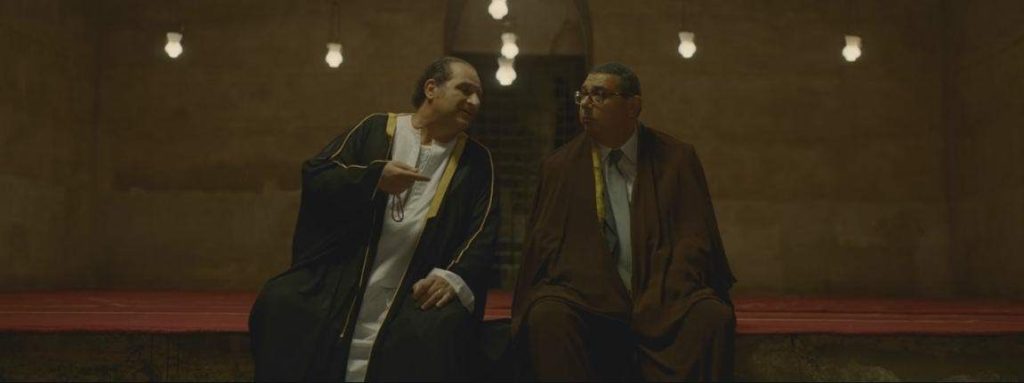The movie – Al Asleyeen – reflects a deviation from the general norm of mainstream Egyptian cinema, especially during Eid Season. I say this because this film is saturated with aspects of incredible depth and craftsmanship, on both a thematic and a technical level.
For starters this movie is a true visual experience. If the magic of cinema is to be able to place you – as a viewer – into the world of the film, then this movie does so successfully. Indeed, the movie’s cinematography perfectly compliments the main theme: namely, the concept of being watched by an organization/entity that seems to be omnipresent, the foundation is called ‘Al Asleyeen’ (translates into ‘The Originals’).
I say perfectly compliments because there are several cinematic frames, where the camera angle makes the viewer feel as though he were watching the protagonists from behind a door. There is one particular scene where the protagonist Samir – played by Maged El Kidwany – orders pizza, and asks the delivery guy to wait for him while he gets the requested money.
While the is delivery guy is waiting for his cash, the guy opens the apartment’s door and takes a sneak peak inside. All this is done and implied using camera movement: the delivery guy is the camera.

This whole notion of being watched matches the entirety of the plot; the plot revolves around Samir’s character a very average Egyptian man, with a typical life. He has a wife – played by Kinda Aloush – who is just in love with shopping, and two university – aged children, a boy and a girl. Samir gets fired from his managerial position at a bank. He then receives an anonymous phone and phone call.

He then arranges a meeting with Khaled El Sawy, who plays the character of Roshdy Abaza and is a representative of an organization called Al Asleyeen (The Originals) who specialize in watching people. Abaza tells Samir that the organization has some sort of patriotic intention, and that every person placed under observation is being placed for reasons of national security.
Abaza procedes to tell Samir that this organization would like to offer Samir a position as one of the organization’s observers, with an attractive salary. Abaza also tells Samir that the organization was inspired by the idea of God; God watches and sees everyone, and this organization “is merely imitating this idea,” states Abaza. Samir eventually accepts the offer.

This bring me to the idea of religion, as is discussed by the movie. The idea of an all knowing, all good, all present God is ever present in the cinematic text. Throughout the cinematic dialogue there are explicit reference to the story of creation, and to God’s omniscience when it came to knowing that Adam would eat the apple and follow Satan.

At another point in the film, the screen is saturated with the Crosses associated with the Christian religion. All these visual and dialectic references explicitly that tie together religion to ideas like omnipresence and omniscience, appear in juxtaposition with the idea of Samir’s first assignment: keeping an eye on Menna Shalaby, who plays a 30 year old PHD holder on the topic of ‘Civilization’ by the name of Thoraya Galal.
I think this film is very philosophical in nature. so much so in fact that the motifs and ideas far surpass narrative norms in importance; cinematic narrative norms like a clear beginning, a climax, and closure are easily compromised for the sake of a plot line that absorbs the viewer in the aforementioned ideas.

While the film has received criticism for being too experimental for mainstream culture’s taste, I think that it is potentially much more beneficial to have a film that openly asks people to explicitly question the aforementioned topics. Furthermore, compared to films that are truly experimental, this film is not experimental.
WE SAID THIS: Share with us your opinions of the film in the comments section.


